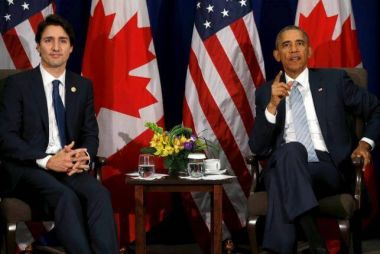Canadians happier, more polite compared to Americans, study based on tweets reveals

It is easy to lump Americans and Canadians together. They live on the same mass of land in the map. They listen to the same types of music, watch the same television shows, and even wear the same brands of clothes.
There is a marked difference, however, between how Americans and Canadians communicate on the social networking site Twitter. Linguists from the McMaster University in Ontario, Canada, found out that Canadians tend to be happier and more polite in their tweets compared to their American counterparts.
According to a report on the university's website, PhD candidates Daniel Schmidtke and Bryor Snefjella reached this conclusion after analysing more than three million tweets geo-tagged from the U.S. and Canada from February to October 2015.
To make their findings more accurate and conclusive, they disregarded commonly used articles like "a," "an," and "the."
Among tweets geo-tagged from Canada, positive words such as "great," "amazing," "favourite," and "beautiful" were among the most used.
Also among the top words used by Canadians on Twitter were "Raptors," "Jays," "Habs," "Leafs," and "hockey"—indicating their love for sports.
In contrast, Americans mostly used curse words, off-colour slang and racial slur on Twitter.
Geo-tagged tweets from the U.S. also contained lots of negative words like "hate," "hell," "annoying," "hurt" and "tired."
"We could see the difference between the two countries' tweets as soon as we created a word cloud of the findings," Schmidtke explained.
This study is actually first to use Twitter to analyse geo-linguistic differences between neighbouring countries which both use English as their primary languages.
The research also covered differences between words used by English and Scottish people, who use almost the same terms.
The linguists are poised to continue their research on the differences on how citizens of various countries communicate online, with hopes that their research could have an impact on government policy and how we understand our global neighbours.











